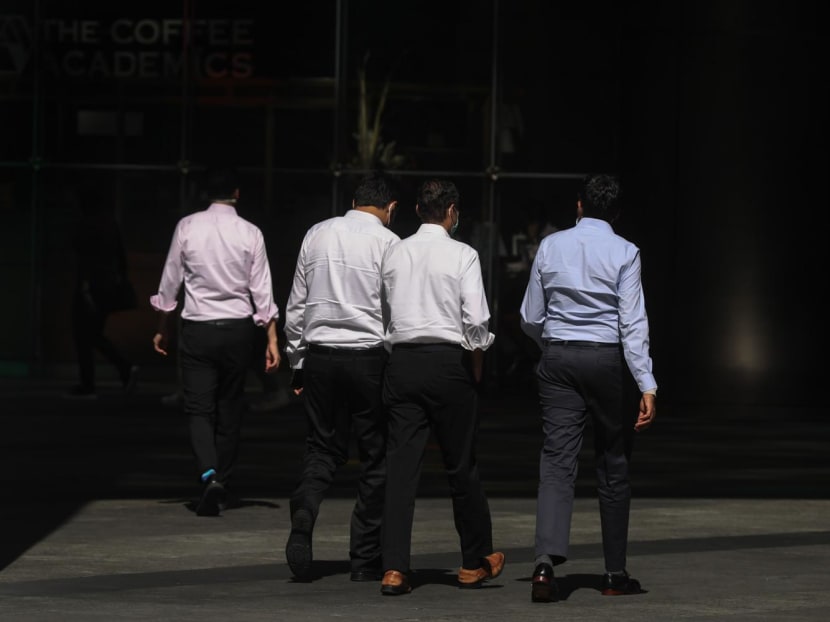Explainer: What is a non-compete clause, and why can an ex-employee get sued after joining a competitor?
SINGAPORE — It is quite common to see employment contracts containing restrictions that generally prevent employees from working for a competitor in the same industry after they leave their job.

Officer workers walking in the Central Business District of Singapore.

This audio is AI-generated.
- Shopee's loss in a lawsuit against a former senior employee working for ByteDance has brought attention to non-compete clauses in Singapore
- These clauses, common in employment contracts, restrict employees from joining competitors for a specified period
- Legal experts TODAY spoke to said enforceability of such clauses depends on factors like duration, geographical scope, and the nature of restrictions
- Currently, Singapore lacks specific regulations on non-compete clauses. Last year, the Minister for Manpower announced plans for guidelines
- Experts advise employees, regardless of position, to carefully review and seek legal advice before signing contracts with non-compete clauses
SINGAPORE — It is quite common to see employment contracts containing restrictions that generally prevent employees from working for a competitor in the same industry after they leave their job.
Known as a non-compete clause, it was thrust into the spotlight on Thursday (Feb 1) after Shopee lost a lawsuit it filed against an ex-senior employee who now works for ByteDance, a competitor.
Shopee took Mr Lim Teck Yong to court after learning of his new job, citing the non-compete clause. It tried to seek interim injunctions to stop Mr Lim from accepting employment with ByteDance and with any of Shopee’s competitors.
The case sparked online discussions on the fairness of a non-compete clause and its enforceability in Singapore. For Shopee’s case, the judge eventually dismissed it, saying Shopee had raised no "serious question" to be tried.
Legal experts TODAY spoke to said the clause can be enforced here, provided it meets specific legal criteria. It is also contingent on its reasonableness in terms of:
- Duration
- Geographical scope
- The nature of the restricted activities
Presently, there are no specific regulations governing non-compete clauses in Singapore.
The courts in Singapore follow the principle of reasonableness to ensure that such clauses do not unduly restrict an individual's ability to earn a living or pursue their chosen profession.
Last year, Manpower Minister Tan See Leng announced that his ministry is developing guidelines for including non-compete clauses in labour contracts.
On Tuesday (Feb 6), Dr Tan announced that the guidelines are being finalised and targeted to be released in the second half of the year.
This came after the United States Federal Trade Commission proposed a ban on non-compete clauses, calling them an “often exploitative practice” that suppresses wages and curbs business innovation.
TODAY looks at how a non-compete clause can be enforced in Singapore, who it covers, and what an employee can do to negotiate before signing an employment contract containing such a clause.
WHAT IS A NON-COMPETE CLAUSE? WHO DOES IT COVER?
Non-compete clauses, also known as restraint of trade clauses, are rules in employment contracts that limit employees from doing similar work or joining a competitor for a set time after they leave their current job.
These clauses are typically included to safeguard the employer's business interests, such as confidential information, trade secrets and client relationships.
What does that mean for lower-ranked employees who are not in the position of having access to confidential information?
Mr Mohammed Shakirin, managing director of Adel Law, said it is not necessarily true that these workers have little to worry about as non-compete clauses can apply to various positions, not just senior executives.
Likewise, Mr Melvin Loh, senior law lecturer at the Singapore University of Social Sciences, said one should not be so quick to think that the clause would not affect them just because they are not holding a key employment position.
“The terms are still part and parcel of the contract. Technically, if (the company) wanted to, and assuming the clause is reasonably constructed, they can try to enforce it when there’s a breach.”
To this, Mr Shakirin advises employees to carefully review the terms and seek legal advice regardless of their position in the company.
Although there are currently no strict guidelines, he said the duration of the non-compete period should be reasonable.
“Generally, durations of six to 12 months are common. Excessive restrictions may render the clause unenforceable by the court. For example, it might be unreasonable to impose a 12-month non-compete clause on a low-ranking administrative support staff.”
HOW ENFORCEABLE IS A NON-COMPETE CLAUSE?
Non-compete clauses are generally enforceable in Singapore.
But it can be challenging to do so unless they are proven reasonable and necessary to protect “legitimate business interests”, such as assets or certain advantages belonging to the employer.
Mr Shakirin said the clauses must not go beyond what is reasonably required to protect those interests, and the courts will carefully scrutinise them.
“The burden of (proof) is on the employer seeking to enforce the non-compete clause,” he said.
Mr Loh said the enforceability of a case also depends on how the clause is structured. “If it’s too wide-ranging, too all-encompassing, it’s very difficult to be regarded as reasonable.”
Citing a 2019 case whereby the plaintiff, HT SRL, took an ex-employee to court for breaching the clause, he said the court found that the company’s clause was phrased in a way that did not only prevent employment with competitors but also stopped the ex-employee from engaging in business with competitors.
“And there was no geographical limitation, such as a term saying you are only restrained from deals in Asia. The clause just said you cannot, which is very wide. So it was deemed unreasonable,” Mr Loh said, noting that the non-compete clause usually comes with geographical limitations.
Ms Elaine Low, associate director of law firm Peter Low Chambers LLC, said the court will also evaluate whether the geographical scope of the clause is reasonable.
She pointed out that an employer is entitled to restrict a former employee from joining a competitor within the same country, assuming the scope and period of the non-compete clause are also reasonable.
“But not, for example, all the countries that the former employer is operating from,” she said.
“Depending on the circumstances, a former employer may even be entitled to restrict the former employee from joining a competitor within the same region, for example, in the Asia market, if the former employee had significant contact with the former employee's business partners or clients in that region.”
Ms Low explained that Singapore, as a global business hub, is the prime location for the headquarters of numerous multinational companies (MNCs), and MNCs have an interest in protecting their business in Singapore and within the region.
WHAT TO LOOK OUT FOR WHEN SIGNING A LABOUR CONTRACT?
When entering a negotiation before signing an employment contract, legal experts advise employees to review the terms carefully and consider whether the non-compete clause will affect their future job opportunities.
Ms Low said employees who are relatively junior ranking or in a non-client-facing role could ask the employer to exclude the non-compete clause on the basis that they are unlikely to encounter any trade or client connections.
“Therefore, there would be no threat to the employer’s legitimate interests. Alternatively, they could negotiate with the employer to specify that the clause be limited to the same role in a competitor company,” she said.
Similarly, Mr Loh said if an employee is uncomfortable with the way the clause is constructed, they can seek clarification from a legal expert on this or consider asking the company whether it is open to revising it.
“Very often, if someone wants the job, they will just take it. If that's the case, they will have to be acutely aware if things don't pan out when they leave the company, the company may try to enforce the clause.”
If a company issues a letter of demand after finding out where an ex-employee currently works, Associate Professor Mervyn Cheong from the National University of Singapore (NUS) said the ex-employee can try to make a case for themselves if they believe no wrong is being done.
“The primary strategy is generally to first try to attack the reasonableness of the non-compete clause. Second, to then say that their new employer is not a competitor.
“Third, to then say, even if they had joined a competitor, their work at the new employer's place does not and will not affect their ex-employer's competitiveness. For example, if they decided to change career paths from graphic designing to marketing work,” said the deputy director of the university's Centre for Pro Bono and Clinical Legal Education.
However, assuming that the court finds a non-compete clause reasonable, valid and enforceable, Ms Low said the only question is whether the former employee had breached it.
“It is irrelevant whether (the person) had misused confidential information in those circumstances. The employee will then likely have to leave the employment of the former employer’s competitor.”
DOES THE CLAUSE STILL APPLY IF YOU WERE RETRENCHED?
If an employee was laid off, Mr Loh said the person is still bound by the contract terms they signed at the start. “So even if (your job) comes to an end, you must honour your end of the bargain, provided the terms are reasonable and well-drafted.”
He also cautioned affected employees against “doing anything (they) want” in the period leading up to the end of their employment.
“Your behaviour might impact future relations. If you leave on a bad note, there’s no guarantee that they will not want to pursue any matters when you leave the company.”
All in all, Mr Loh believes that non-compete clauses should ideally be tailored to fit each individual’s role and expertise.
“If this person has access to confidential information, their restraint of trade might be more stringent. But the same obligations should not apply to someone who is just a team member,” he said.
“It is way too onerous. They can’t just sit around for six months doing nothing.”










